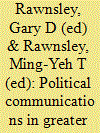| Srl | Item |
| 1 |
ID:
066025


|
|
|
| 2 |
ID:
047826


|
|
|
|
|
| Publication |
London, routledgeCurzon, 2003.
|
| Description |
xi, 326p.
|
| Standard Number |
070071734X
|
|
|
|
|
|
|
|
|
|
|
|
Copies: C:1/I:0,R:0,Q:0
Circulation
| Accession# | Call# | Current Location | Status | Policy | Location |
| 047138 | 324.951/RAW 047138 | Main | On Shelf | General | |
|
|
|
|
| 3 |
ID:
065377


|
|
|
| 4 |
ID:
134310


|
|
|
|
|
| Summary/Abstract |
This paper analyses how Taiwan exercises “soft power” and uses public diplomacy to engage with the international community, and to compensate for the absence of formal diplomatic relations with major powers. The research suggests that Taiwan’s strategies of international engagement are constrained by its external and internal political environments. The international system (structure) has locked Taiwan into a set of challenging arrangements over which it has little control or influence, while Taiwan’s public diplomacy architecture and the activities organised and undertaken by its government agencies in Taibei and its representatives abroad (agency) reveal, at best, a misunderstanding of how Taiwan’s soft power might be exercised more effectively. The strategic thematic choices of legitimacy (invoking Taiwan’s international status) versus credibility (which in soft power terms offers the most benefit), and the decision to privilege cultural over political themes in international communications, all have profound effects on the success of Taiwan’s soft power.
|
|
|
|
|
|
|
|
|
|
|
|
|
|
|
|